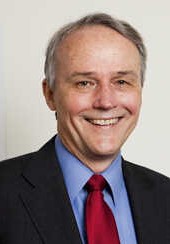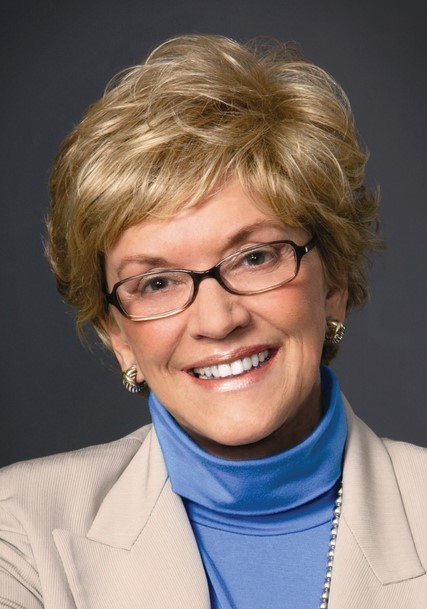

David Beckmann and Jo Luck
UNITED STATES
David Beckmann reshaped international development programs to better reflect the needs of the world’s poor as a World Bank economist. As president of the organization Bread for the World, he spearheaded grassroots efforts to change the conditions that allow hunger and poverty to persist.
Jo Luck built Heifer International into one of the world’s premier hunger fighting non-profit organizations, providing income-producing animals to more than 12 million families globally.
Full Biographies
David Beckmann
Born in Nebraska, David Beckmann is a Lutheran pastor and economist. He earned his bachelor’s degree from Yale University, and after graduation, earned a fellowship to study religion in rural Ghana, where he saw firsthand the debilitating effects of hunger and poverty. His belief that people could help affect change led him to earn both his Master of Divinity degree from Christ Seminary in 1974 and his Master of Science degree in Economics from the London School of Economics in 1975. He spent a year working in remote villages in Bangladesh before being offered a position at the World Bank.
For 15 years, Beckmann worked on poverty issues at the World Bank, supervising projects in East Africa and Latin America, serving as a speechwriter for the president of the World Bank, and as the senior advisor on nongovernmental organizations.Then in 1991, he became president of the Washington D.C.-based Bread for the World, a leading U.S. advocacy organization focused on hunger issues.
In both his work at the World Bank and then as head of Bread for the World, Beckmann played a significant role in shaping international development programs so that they truly reflected the needs of the poorest people in the world, and in mobilizing a grassroots effort for more focused policies and increased appropriations for hunger alleviation by the U.S. government and its partners.
Bread for the World is described as “a collective Christian voice urging decision makers to end hunger at home and abroad.” As the organization’s second president, Beckmann marshaled an average of a quarter of a million constituent contacts a year with elected officials through letters, email messages and meetings. Bread’s army of citizen advocates engaged an ever-expanding network of concerned people urging support for legislation to change the policies, programs and conditions that allow hunger and poverty to persist.
Beckmann’s inspired leadership resulted in a dramatic growth in the organization’s grassroots, bipartisan participation. Its membership, found in all 435 congressional districts of the United States, increased from 44,500 people to more than 72,500 people from 1999 to 2009. In addition, through the more than 5,000 local Christian church congregations and 50 national denominations that are counted as members of Bread, more than 1 million people became actively engaged in advocacy to end hunger.
The innovative and impassioned strategies Beckmann implemented to rally public support for bringing about policy changes resulted in important legislation focused on long-term solutions, including increased resources for agricultural science and technology as well as support for development in poor countries.
The impacts of the government policies and programs that Beckmann fought for have brought hundreds of millions of people out of hunger and poverty: The U.S. Congress tripled poverty-focused development assistance during the first decade of the 21st century, from $7.5 billion in Fiscal Year (FY) 2000 to $22 billion in FY2010; U.S. aid to Africa quadrupled and funding for agriculture and rural infrastructure increased eightfold; domestic nutrition programs and federal food assistance to needy families increased from $33 billion in FY2000 to $80 billion in FY2009; and reforms in the U.S. Farm Bill provided greater opportunity for struggling families in rural America and rural areas of the developing world.
While these positive strides have many causes, they would not have happened without David Beckmann and Bread for the World leading citizen advocates across the country to press for change.
Beckmann’s personal commitment to founding and strengthening other organizations working in concert to improve the lives of the poor has also had a major impact in reducing world hunger.
In 2004, he founded the U.S Alliance to End Hunger, which brought together diverse religious groups, charities, foundations, corporations, unions and individuals to coalesce the public will to end hunger in the United States and worldwide. Beckmann has helped to build and strengthen the political influence of many other humanitarian organizations, including the Partnership to Cut Hunger and Poverty in Africa, the ONE Campaign, InterAction, World Vision, Feeding America, the Global Foodbanking Network, Universities Fighting World Hunger, MAZON: The Jewish Response to Hunger, and the UN Millennium Hunger Task Force.
Beckmann authored many articles and books, including Transforming the Politics of Hunger, Grace at the Table: Ending Hunger in God’s World, and Exodus from Hunger: We Are Called to Change the Politics of Hunger.
In honoring David Beckmann and Jo Luck, president and CEO of Heifer International, as its 2010 Laureates, The World Food Prize recognized the critical efforts of non-governmental organizations in mobilizing and empowering everyday citizens to end hunger in communities around the world.
David Beckmann made it his life’s work to end hunger through political engagement and advocacy. “The binding constraint on progress against hunger is lack of political will,” he said. “Creating that political will, that give-a-damn, to get governments and especially the U.S. government to care and to do the things that we know can help is the most crucial thing we can do to overcome hunger.”
Jo Luck
Jo Luck was born in 1941 in Little Rock, Arkansas. Her first international experience was at age 4, when, after her father was drafted for World War II, she and her mother were among the first military families to board ships to Japan. She was exposed to harsh post-war living conditions during the year they lived there before moving back to the United States.
Jo Luck studied education at Hendrix College, earned a degree at David Lipscomb College, and became a teacher. In 1978, she was hired to become the first director of the Arkansas Advocates for Children and Families. She credits her experiences working with families with teaching her that everyone deserves personal dignity and the opportunity to rise out of poverty.
A year later, she was appointed to then-Gov. Bill Clinton’s cabinet as Director of Parks and Tourism where she doubled Arkansas’ tourism industry by focusing on the state’s natural beauty and ecological resources. She later attended the Harvard University John F. Kennedy School of Government and Harvard Business School, Executive Education Program.
During her time directing Parks & Tourism, Jo Luck continued to teach adults at night. In her classes on leadership and motivation, one of the assignments she gave to her students was to draw a picture of where they would be in five years. On one occasion in 1989, the class turned things around and asked Jo Luck to draw a picture depicting where she would be in five years. Without having given it much thought, she drew herself in a circle of women, sitting on the ground with animals nearby in a rural setting. She can’t explain exactly where it came from, but that is the picture she envisioned for herself. Within three weeks, a head hunter called Jo Luck and said that she had been highly recommended to him to consider for the position of director of global services at Heifer International.
In her role at Heifer International, Jo Luck traveled to remote parts of the world. She quickly noticed that although women did most of the agricultural work, men received most of the training from Heifer. So she pursued a major initiative to train and empower women. In 1992, she was promoted to CEO. In this role, Jo Luck expanded the scope and impact of the organization’s activities throughout Africa, the Americas, Asia and the South Pacific, and Central and Eastern Europe, combating hunger by teaching poor communities how to become self-sustaining. Jo Luck and Heifer educated and advocated on behalf of the world’s resource-poor and hungry, working with local and global partners to influence and change policies, systems and practices in ways that improve people’s lives.
Jo Luck created innovative public education initiatives to link grassroots donors in rich countries to recipients in developing countries, increasing the knowledge and awareness of adults and children of all walks of life regarding global hunger and poverty issues. Reaching out to supporters in this way took the message of Heifer’s sustainable solutions to hunger and poverty directly into hundreds of thousands of United States homes. She created Heifer’s gift catalogue and enlisted celebrities to bring more awareness of global agriculture issues and to fundraise for Heifer’s programs.
The result was a significant increase in support for Heifer projects through donations from households, faith communities, schools, civic groups and individuals of all ages. The number of steadfast supporters grew from 20,000 in 1992 to more than 500,000 in 2009. The organization’s outreach activities enabled 12 million families, including 1.5 million families in 2009 alone, to put nutritious food on their own tables and also contribute to feeding others through Heifer’s practice of “passing on the gift,” in which recipient families give a female offspring of their animal to another family in need.
In implementing Heifer’s programs internationally, Jo Luck saw the need to more fully engage food-secure people to participate in programs to help food-insecure women, men, and children in countries around the world. Her innovative approaches at Heifer included increasing the public’s understanding of how the life choices made by people in rich countries affect people around the world, especially those living with hunger and in poverty; issuing a call to action to grassroots supporters to make individual financial contributions that collectively sponsor more than 30 kinds of livestock and animals—from bees to water buffaloes—along with trees, seeds and training that are provided to recipients; and building capacity within resource-poor communities to produce a sustainable food supply and sustainable livelihoods.
These approaches included implementing a highly successful values-based planning process for community development, the “Cornerstones for Just and Sustainable Development” model. This program improved human nutrition, management of animal and natural resources, and human spiritual growth with training in organizational and business development, leadership, gender equity and environmental conservation practices. And finally, Jo Luck worked at binding together people emotionally and economically, enabling them to envision and create a better life for themselves and their children.
Jo Luck served as president and CEO of Heifer International, headquartered in Arkansas, from 1992 to 2010. In 2010 she stepped down as CEO, and retired from the organization in 2011. She was appointed to several boards, including the U.S. Agency for International Development’s Board for International Food and Agricultural Development (BIFAD).
In honoring Jo Luck, along with David Beckmann of Bread for the World, in 2010, The World Food Prize recognized the critical efforts of non-governmental organizations in mobilizing and empowering everyday citizens to end hunger in communities around the world.
One of the most inspirational speakers in the world on the issue of hunger, poverty and food security, in 2014 Jo Luck addressed the more than 200 high school students attending the World Food Prize Iowa Youth Institute. Following her address, one high school student remarked, “Hearing how one woman like Jo Luck can make a huge difference motivated me to take actions of my own, even though I am just a young girl from small-town Iowa.”
Additional Links
2014 Iowa Youth Institute: Jo Luck's Keynote
World Food Prize Winners Talk Changing The World
David Beckmann on the World Food Prize


